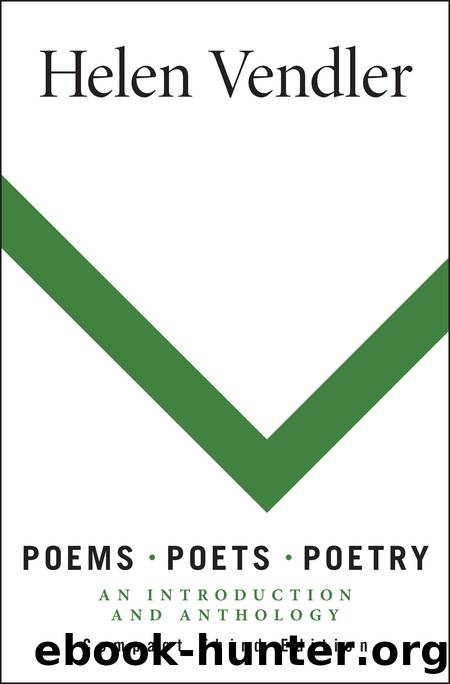Poems, Poets, Poetry by Helen Vendler

Author:Helen Vendler
Language: eng
Format: epub
Tags: English/Literature
Publisher: Macmillan Higher Education
Published: 2017-08-21T00:00:00+00:00
LANGSTON HUGHES (1902 – 1967)
High to Low
God knows
We have our troubles, too —
One trouble is you:
you talk too loud,
cuss too loud,
look too black,
don’t get anywhere,
and sometimes it seems
you don’t even care.
The way you send your kids to school
stockings down,
(not Ethical Culture)
the way you shout out loud in church,
(not St. Phillips)
and the way you lounge on doorsteps
just as if you were down South,
(not at 409)
the way you clown —
the way, in other words,
you let me down —
me, trying to uphold the race
and you —
well, you can see,
we have our problems,
too, with you.
The blacks who are looked down on by the Ethical Culture / St. Phillips set (the names are those of a fashionable school and church) are already having pejorative identities (“too loud,” “too black,” “don’t even care”) constructed for them by their very own fellow blacks. Add these to the identities constructed for them by the surrounding whites, and the construction of an authentic self has two strikes against it before it can begin. Even the notion of what an “authentic self” might be is modeled by cultural expectations into which we are born.
Poetry is one of the great means in which one identity reaches out to another, tries to explain itself to another, brings up images to clarify itself (Rich’s meal bursting into flames in the oven, Hughes’s grinning and ornery mule), finds a diction that speaks its mind, and finds a stylized form to enact its appeal. There is a danger that a reader will take the identity in a lyric as more simple than it is, and will mentally invoke a stereotype of the female speaker or the black speaker or the gay speaker or the Catholic speaker. But good poems are thoroughly considered constructions; and in order for the poem to be interesting, the author must critique or reinvent the social stereotype. A lyric to keep in mind when reading identity-poems is Seamus Heaney’s “Terminus,” a poem announcing that a poet’s identity is always at least a double one, because any poet worthy of the name has “second thoughts.” Heaney, a Northern Irish poet, grew up on a farm but within sight of industry, in a rural place where people still used horses to draw wagons but took the train to go to the city. One “terminus” or border of the farm was the “march drain” — the creek marking the border (“march”) between two parishes. Heaney, as a child, lived also along divides in the world of words — on the borderline between his parents’ secular proverbs and their Biblical stories — both equally stimulating to the nascent poet’s mind. And he lived between the present (Northern Ireland governed by England) and the better past (before the Irish earls, defeated by the British, fled to France in 1798, ending Irish independence). “Is it any wonder,” the poet asks, given all these influences on my identity, that “when I thought / I would have second thoughts?” Any reflective poet has “second thoughts” about both inherited and
Download
This site does not store any files on its server. We only index and link to content provided by other sites. Please contact the content providers to delete copyright contents if any and email us, we'll remove relevant links or contents immediately.
| Books & Reading | Comparative Literature |
| Criticism & Theory | Genres & Styles |
| Movements & Periods | Reference |
| Regional & Cultural | Women Authors |
4 3 2 1: A Novel by Paul Auster(11036)
The handmaid's tale by Margaret Atwood(6839)
Giovanni's Room by James Baldwin(5873)
Big Magic: Creative Living Beyond Fear by Elizabeth Gilbert(4719)
Asking the Right Questions: A Guide to Critical Thinking by M. Neil Browne & Stuart M. Keeley(4567)
On Writing A Memoir of the Craft by Stephen King(4206)
Ego Is the Enemy by Ryan Holiday(3983)
Ken Follett - World without end by Ken Follett(3968)
The Body: A Guide for Occupants by Bill Bryson(3791)
Bluets by Maggie Nelson(3705)
Adulting by Kelly Williams Brown(3663)
Guilty Pleasures by Laurell K Hamilton(3578)
Eat That Frog! by Brian Tracy(3509)
White Noise - A Novel by Don DeLillo(3430)
The Poetry of Pablo Neruda by Pablo Neruda(3358)
Alive: The Story of the Andes Survivors by Piers Paul Read(3304)
The Bookshop by Penelope Fitzgerald(3222)
The Book of Joy by Dalai Lama(3212)
Fingerprints of the Gods by Graham Hancock(3207)
